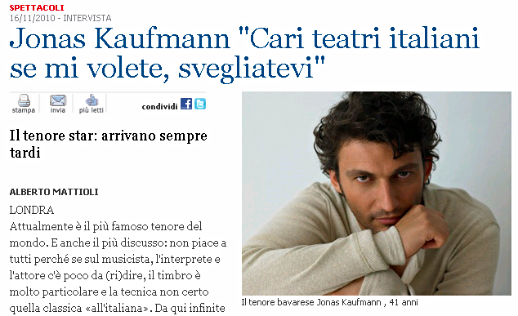

He is currently the most famous tenor in the world. And also the most discussed: not everyone likes him, because if there is not much to object about his musicianship and acting, his timbre is very particular and his technique certainly is not the classic “Italian-style”. This caused numerous controversies, recently rekindled by the release of his latest DECCA CD, Verismo arias, a repertory of “knife” operas, from Cav and Pag (but there are also titles that are not verismo at all, such as Mefistofele, Zandonai’s Giulietta e Romeo and even Ponchielli’s I Lituani), which is an unusual choice for a German singer. However, the orchestra is ours, Santa Cecilia’s, and the conductor half Italian, Antonio Pappano. Regarding his looks, there is no argument: his idolatrous success with ladies and gay men, four fifths of the opera-goers, is a proof of it.
He is Jonas Kaufmann, 41 years old, Bavarian from Munich, the tenorissimo who has given an injection of healthy divismo to a world of opera that has always needed divos. However, he doesn’t wear the clothes of a divo with ease, because he is able to have a hearty laugh, even about his less than infallible vocal cords, for this summer he has disappointed half the world canceling two performances of Lohengrin in Bayreuth and a recital in Salzburg, among scenes of desperation of fans in mourning as one had not seen in a long time.
Q: You are already being accused of taking too many engagements.
A: I don’t like to cancel, but if I am not well, I am not well. And it is better to disappoint my audience one evening rather than shortening my career singing over pharyngitis.
Q: Why a recording of Verismo arias?
A: Why not? It’s splendid repertoire.
Q: But also out of fashion…
A: True, and it’s a pity. On Friday I an singing Adriana Lecouvreur here in London and I find it a magnificent opera.
Q: But from you we expect psychologically complicated characters, such as your wonderful Werther, not the big tenor roles.
A: But I am not dropping Werther or Lohengrin. However, I have always dreamt of singing Andrea Chénier or Cavalleria rusticana. Sure, I know they are dangerous operas.
Q: Why dangerous?
A: Because it is music you sing with raw nerves, very passionately. The risk is to get carried away and overdo, and this is not good for the voice. This is why I have always refused Otello so far.
Q: Rumor has it you are about to debut a huge number of roles.
A: I have already scheduled Chénier, Cav and Pag, La fanciulla del West, Manon Lescaut, Il trovatore, La forza del destino and Les Troyens.
Q: Wow! Obviously, none of this in Italy…
A: I would love to sing in Italy, but how is it possible? In Italy they ask for your availability six months on advance, as opposed to the five years in the rest of the world. And I can’t keep myself free for three months a year waiting for some Italian house to wake up. However in February I will go back to La Scala, with Tosca.
Q: You do know that the Bondy production staged at the Met and in Munich will never succeed at La Scala? And perhaps this time for a reason…
A: I myself told Bondy: look, if you stage this Tosca at La Scala, there’s going to be trouble. Bondy is a great director, but this time, in my opinion, he did not take this opera seriously. However he will come to Milan to restage it and I hope he will make adjustments.
Q: Your autobiography has been released in Germany. Isn’t it a bit too early, at 41?
A: Yes, but they would have written a book about me anyway, so I thought it was better to do it myself, rather than some of those journalists who know nothing about opera.
Q: If you had not been so handsome, would you have had the same success?
A: I don’t know. But if I am like this, it’s not a merit or a fault. The true problem is that the opera public also goes to the movies and watches TV, and therefore it has less and less imagination. In the past it was easier. Pavarotti and Caballé came on stage, stood still, sang like a God and everyone was happy. Today this is no longer sufficient. And, mind, for us singers this is not good, because everything has become more difficult.
Q: Will you keep singing Wagner?
A:Yes, my next debut will be Siegmund in New York.
Q: And Tristan, when?
A: Not for at least five years. It breaks your voice. And I like this job too much to have to stop too soon. [La Stampa]

























Comments